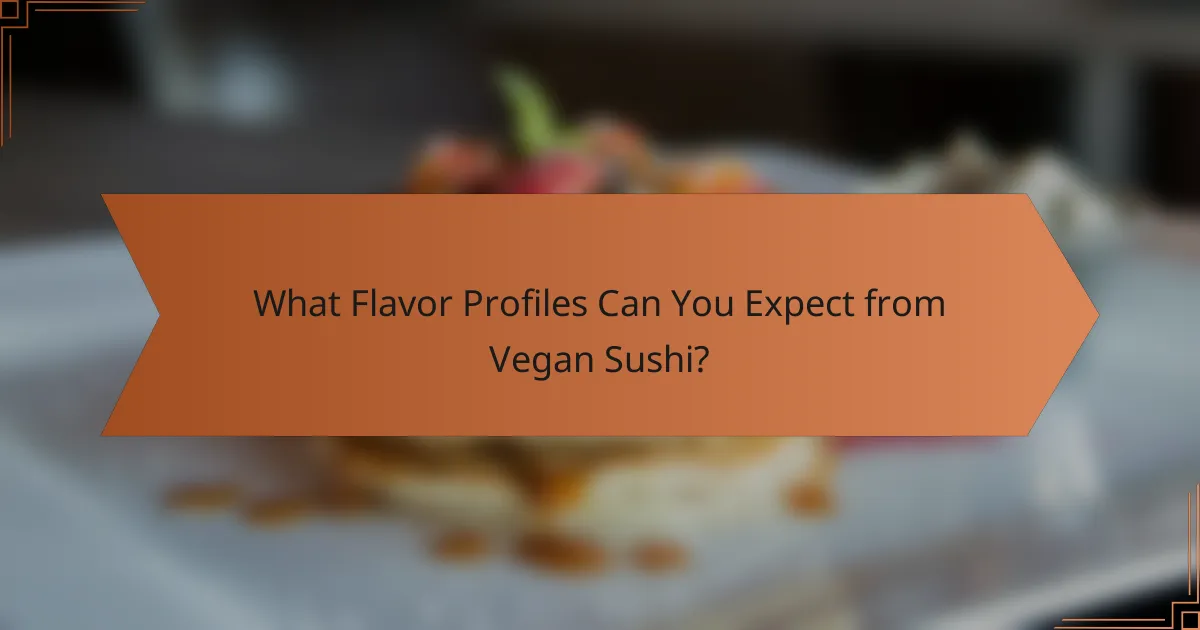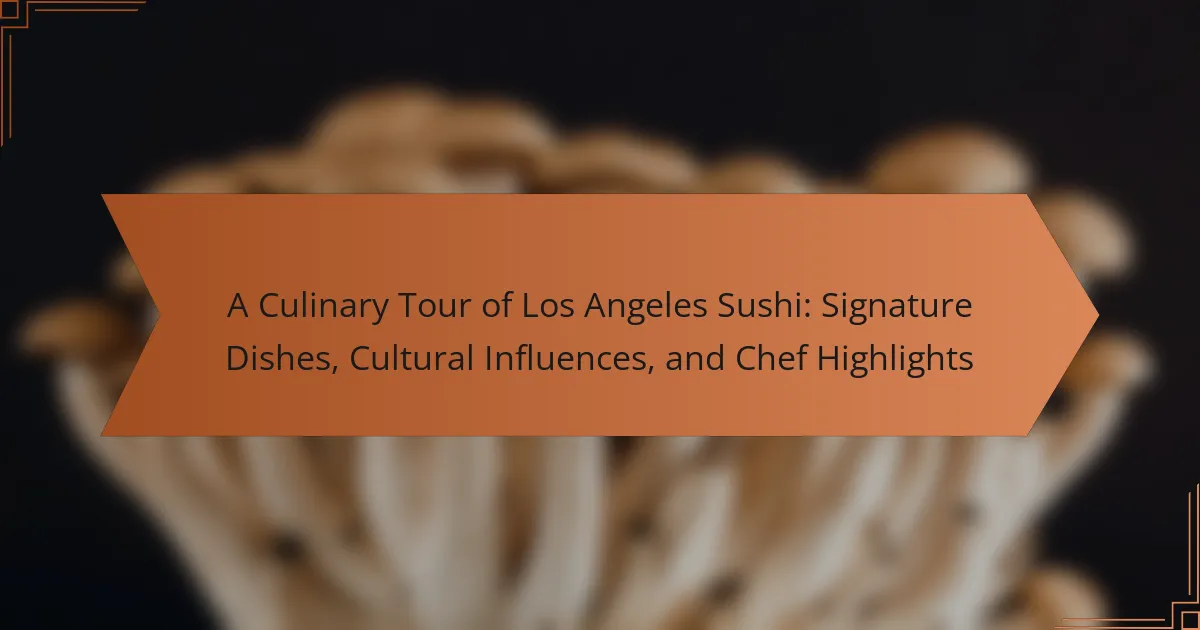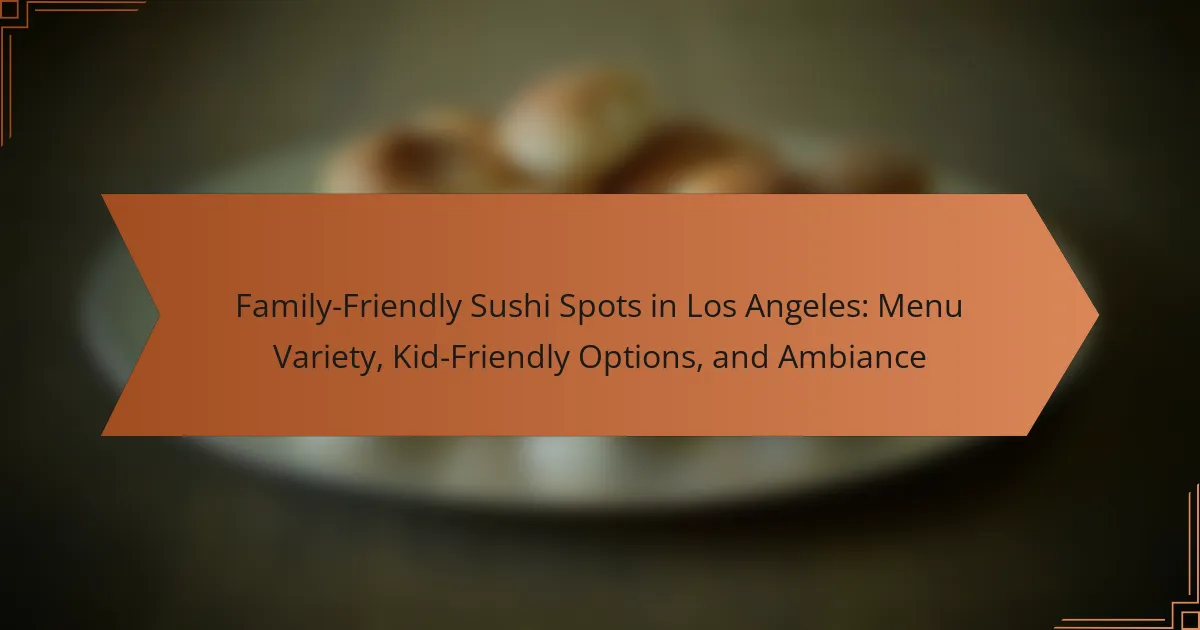Vegan sushi in Los Angeles features a variety of creative options that utilize plant-based ingredients to replace traditional seafood. Notable selections include the Rainbow Roll at Plant Power Fast Food, the Vegan Spicy Tuna Roll at Sushi Nozawa, and the California Roll at KazuNori, all showcasing unique combinations of vegetables like avocado, cucumber, and sweet potato. This article highlights the diverse flavor profiles of vegan sushi, emphasizing common ingredients such as tofu, seaweed, and pickled vegetables that enhance taste and presentation. Readers will also find recommendations for restaurants that exemplify the versatility and appeal of vegan sushi in the city.

What are the Top Vegan Sushi Options in Los Angeles?
Top vegan sushi options in Los Angeles include the Rainbow Roll at Plant Power Fast Food, featuring a variety of vegetables. Another popular choice is the Vegan Spicy Tuna Roll at Sushi Nozawa, made with tomato and avocado. Additionally, the California Roll at KazuNori uses cucumber and avocado instead of crab. The Vegan Dragon Roll at Shojin offers sweet potato and avocado, wrapped in seaweed. Lastly, the Vegan Sushi Burrito at The Sushi Bar combines sushi ingredients in a convenient wrap format. These options reflect the creativity and flavor profiles of vegan sushi in the city.
How is vegan sushi different from traditional sushi?
Vegan sushi differs from traditional sushi primarily in its ingredients. Traditional sushi often includes raw fish or seafood as a main component. In contrast, vegan sushi substitutes these animal products with plant-based ingredients. Common vegan sushi fillings include avocado, cucumber, and pickled vegetables. Some vegan options use ingredients like tofu or tempeh for protein. Rice and nori remain staples in both types of sushi. Vegan sushi caters to those avoiding animal products for dietary or ethical reasons. This distinction is essential for understanding the different culinary approaches.
What creative ingredients are commonly used in vegan sushi?
Creative ingredients commonly used in vegan sushi include avocado, cucumber, and pickled vegetables. Avocado adds creaminess and healthy fats. Cucumber provides a refreshing crunch. Pickled vegetables add tanginess and depth of flavor. Other popular ingredients are tofu, tempeh, and marinated mushrooms. Tofu offers protein and a versatile texture. Tempeh adds a nutty flavor and is high in protein. Marinated mushrooms can enhance umami taste. Seaweed, such as nori, is essential for wrapping sushi. Additionally, sprouts and microgreens provide freshness and visual appeal. These ingredients contribute to the unique flavor profiles of vegan sushi.
How do flavor profiles vary in vegan sushi compared to traditional options?
Vegan sushi flavor profiles differ significantly from traditional sushi. Traditional sushi often features fish, seafood, and umami-rich ingredients. These elements provide a savory depth and complexity. In contrast, vegan sushi relies on plant-based ingredients. Common components include vegetables, tofu, and seaweed.
The absence of fish alters the umami experience. Vegan sushi often incorporates flavors from sauces and seasonings. Ingredients like avocado, mango, and pickled vegetables add sweetness and creaminess. Spices and herbs can introduce freshness and zest.
The overall flavor balance in vegan sushi tends to be lighter. Traditional sushi’s richness from fish is replaced by the crispness of vegetables. This results in a different mouthfeel and taste sensation. The variation in flavor profiles caters to diverse dietary preferences.
Why is vegan sushi gaining popularity in Los Angeles?
Vegan sushi is gaining popularity in Los Angeles due to increasing health consciousness and demand for plant-based diets. Many consumers are seeking healthier alternatives to traditional sushi. Vegan sushi offers diverse flavors and creative ingredient combinations. Restaurants are innovating with ingredients like avocado, cucumber, and tofu. This aligns with the city’s vibrant food culture and emphasis on sustainability. Additionally, the rise of veganism in general contributes to this trend. A 2021 survey indicated that 39% of Americans are trying to incorporate more plant-based meals. This growing interest is reflected in the expanding number of vegan sushi restaurants in the area.
What health benefits are associated with vegan sushi?
Vegan sushi offers numerous health benefits. It is typically low in calories, making it a great option for weight management. The use of fresh vegetables and seaweed provides essential vitamins and minerals. Ingredients like avocado and nuts contribute healthy fats, promoting heart health. Vegan sushi is often rich in fiber, which aids digestion. Additionally, it can be high in antioxidants, supporting overall health. Studies show that plant-based diets can reduce the risk of chronic diseases. Therefore, incorporating vegan sushi into one’s diet can lead to improved health outcomes.
How does the vegan lifestyle influence sushi choices?
The vegan lifestyle significantly influences sushi choices by prioritizing plant-based ingredients. Vegans avoid fish and seafood, leading to the creation of sushi rolls featuring vegetables, fruits, and alternative proteins. Common vegan sushi ingredients include avocado, cucumber, and carrots. Additionally, tofu and tempeh are often used as protein sources. Many sushi restaurants in Los Angeles now offer specialized vegan menus. These menus highlight creative combinations and unique flavor profiles. The demand for vegan options has increased, prompting chefs to innovate. This shift reflects a broader trend towards plant-based diets in urban areas.
Where can you find the best vegan sushi restaurants in Los Angeles?
The best vegan sushi restaurants in Los Angeles include Plant Food + Wine, Sushi Nishi, and KazuNori. Plant Food + Wine offers innovative sushi using fresh vegetables and unique sauces. Sushi Nishi specializes in plant-based rolls that mimic traditional sushi flavors. KazuNori is known for its hand rolls featuring high-quality vegan ingredients. These restaurants are frequently praised for their creativity and flavor profiles. Reviews highlight their commitment to fresh, sustainable ingredients. Each restaurant has garnered positive feedback on platforms like Yelp and TripAdvisor.
What are the top-rated vegan sushi restaurants according to locals?
It is not possible to provide a definitive list of the top-rated vegan sushi restaurants according to locals. Specific rankings can vary based on personal preferences, location, and recent reviews. To find the best options, checking local review platforms such as Yelp or Google Reviews is recommended. These platforms aggregate feedback from diverse diners and can provide up-to-date information on popular vegan sushi spots in Los Angeles.
How do customer reviews impact the reputation of vegan sushi spots?
Customer reviews significantly influence the reputation of vegan sushi spots. Positive reviews enhance visibility and attract new customers. They serve as social proof, validating the quality and taste of the offerings. Conversely, negative reviews can deter potential patrons. A study by BrightLocal found that 91% of consumers read online reviews before making a purchase. This indicates the importance of customer feedback in shaping perceptions. Vegan sushi spots with higher ratings often see increased foot traffic and sales. Reviews also impact search engine rankings, making them crucial for online visibility. Overall, customer reviews are a key factor in establishing and maintaining a strong reputation for vegan sushi restaurants.

What Creative Ingredients are Used in Vegan Sushi?
Vegan sushi utilizes a variety of creative ingredients to replace traditional seafood. Common ingredients include avocado, which adds creaminess and healthy fats. Cucumber provides a refreshing crunch, while carrots offer sweetness and color.
Tofu is often marinated and used for protein, adding texture and flavor. Seaweed salad introduces umami and a unique taste profile. Other popular additions are mango for sweetness and pickled vegetables for tang.
These ingredients not only enhance the flavor but also create visually appealing dishes. Vegan sushi showcases the versatility of plant-based foods in a traditional format.
What are the most popular vegetables used in vegan sushi?
The most popular vegetables used in vegan sushi include cucumber, avocado, and carrots. Cucumber adds a refreshing crunch to sushi rolls. Avocado provides a creamy texture and rich flavor. Carrots contribute sweetness and vibrant color. Other common vegetables are bell peppers and radishes. Bell peppers offer a sweet and crisp bite. Radishes add a peppery taste and crunch. These vegetables are widely favored for their taste and texture in vegan sushi.
How are fruits incorporated into vegan sushi recipes?
Fruits are incorporated into vegan sushi recipes by serving as fillings or toppings. Common fruits used include avocado, mango, and cucumber. These fruits add flavor, texture, and nutritional value to the sushi. Avocado provides creaminess, while mango adds sweetness. Fruits can also enhance the visual appeal of the sushi. Some recipes include fruits like strawberries or kiwi for a unique twist. The use of fruits in vegan sushi reflects creativity and innovation in plant-based cuisine. This approach allows for a variety of flavor profiles that appeal to different palates.
What role do plant-based proteins play in vegan sushi?
Plant-based proteins are essential in vegan sushi as they provide the necessary nutritional value and texture. Common sources include tofu, tempeh, and legumes. These proteins contribute to the overall protein content, making the sushi more filling. They also mimic the texture of traditional sushi ingredients like fish. For example, marinated tofu can replicate the umami flavor of seafood. Additionally, plant-based proteins enhance the dish’s health benefits. They offer essential amino acids and are lower in saturated fat compared to animal proteins. This makes vegan sushi a healthier option for consumers. Overall, plant-based proteins play a crucial role in both the taste and nutritional profile of vegan sushi.
How do sauces and seasonings enhance vegan sushi dishes?
Sauces and seasonings enhance vegan sushi dishes by adding depth and complexity to flavors. They provide contrast to the subtle taste of vegetables and rice. Common sauces like soy sauce, teriyaki, and spicy mayo contribute umami and sweetness. Seasonings such as sesame seeds or wasabi can introduce nuttiness and heat. These enhancements elevate the overall dining experience. They also allow for creativity in flavor combinations, making vegan sushi appealing to a wider audience. The right balance of sauces and seasonings can transform simple ingredients into a gourmet dish.
What are some unique sauces that complement vegan sushi?
Unique sauces that complement vegan sushi include spicy tahini sauce, mango chili sauce, and miso ginger dressing. Spicy tahini sauce adds a creamy texture and nutty flavor. It is made from ground sesame seeds and can be spiced up with chili paste. Mango chili sauce offers a sweet and spicy kick. This sauce combines ripe mango with chili for a vibrant taste. Miso ginger dressing provides a tangy and umami-rich flavor. It blends miso paste with fresh ginger and rice vinegar. These sauces enhance the flavor profiles of vegan sushi dishes.
How can seasoning elevate the flavor of vegan sushi rolls?
Seasoning enhances the flavor of vegan sushi rolls by adding depth and complexity. Various seasonings like soy sauce, sesame oil, and rice vinegar contribute distinct tastes. For example, soy sauce provides umami, which balances the freshness of vegetables. Sesame oil adds nuttiness, enriching the overall flavor profile. Rice vinegar introduces acidity, brightening the dish. Herbs and spices, like wasabi and pickled ginger, offer contrasting flavors that elevate the sushi experience. According to culinary experts, proper seasoning can transform simple ingredients into a gourmet dish.

What Flavor Profiles Can You Expect from Vegan Sushi?
Vegan sushi offers a diverse range of flavor profiles. Common flavors include umami, sweetness, and freshness. Ingredients like avocado and cucumber contribute creamy and refreshing tastes. Seaweed adds a briny, ocean-like flavor. Pickled vegetables provide tanginess and acidity. Spicy sauces can introduce heat and depth. Additionally, fruits like mango or pineapple add sweetness and tropical notes. These varied flavors create a complex and enjoyable culinary experience.
How do different ingredients affect the flavor of vegan sushi?
Different ingredients significantly influence the flavor of vegan sushi. The choice of rice, seaweed, and fillings creates distinct taste profiles. Sushi rice, often seasoned with vinegar, adds a tangy base flavor. Nori, the seaweed wrap, contributes umami and a slight brininess.
Vegetables like cucumber and avocado provide freshness and creaminess. Pickled ingredients, such as ginger or daikon, introduce acidity and sharpness. Additionally, sauces like soy sauce or spicy mayo enhance the overall taste experience.
Herbs and spices, such as sesame seeds or wasabi, add depth and complexity. The combination of these elements results in a balanced and flavorful dish. Each ingredient plays a crucial role in shaping the overall flavor profile of vegan sushi.
What are the taste differences between various types of vegan sushi?
Vegan sushi varies in taste based on its ingredients and preparation methods. Traditional sushi flavors often come from seafood, but vegan options substitute with vegetables, fruits, and plant-based proteins. For example, avocado rolls provide a creamy texture and mild flavor, while spicy tofu rolls offer a savory, slightly spicy taste.
Mango or cucumber rolls are refreshing and sweet, enhancing the overall flavor profile. Additionally, the use of sauces, such as soy sauce or spicy mayo, can significantly alter taste experiences. Some vegan sushi incorporates unique ingredients like pickled vegetables, which add tanginess.
Overall, the taste differences stem from the variety of fillings and the creativity of the chefs in using plant-based ingredients. These variations create a diverse range of flavors, appealing to different palates.
How can you pair vegan sushi with beverages for a complete experience?
Pair vegan sushi with beverages like green tea, sake, or craft beer for a complete experience. Green tea enhances the umami flavors in sushi. It is rich in antioxidants and complements the freshness of vegetables and rice. Sake, particularly junmai or ginjo, pairs well due to its clean taste and slight sweetness. It elevates the overall dining experience. Craft beer, especially light ales or IPAs, can contrast with the sushi’s textures. These beverages bring out the flavors in the ingredients used in vegan sushi.
What are some signature flavor combinations in vegan sushi?
Signature flavor combinations in vegan sushi include avocado and cucumber, which provide a creamy and crunchy texture. Another popular pairing is mango and spicy tofu, offering sweetness and heat. Additionally, pickled radish and sesame seeds create a tangy and nutty profile. Carrot and cream cheese alternatives combine earthiness with smoothness. Lastly, roasted sweet potato and tahini sauce deliver a rich and savory experience. These combinations highlight the versatility of plant-based ingredients in sushi.
How do regional influences shape the flavor profiles of vegan sushi in Los Angeles?
Regional influences significantly shape the flavor profiles of vegan sushi in Los Angeles. The city’s diverse culinary landscape incorporates various global cuisines. This results in unique ingredient combinations and flavor fusions. For example, Mexican flavors often blend with traditional sushi elements, creating dishes with avocado and spicy sauces. Additionally, Asian influences from Korean and Thai cuisines introduce ingredients like kimchi and coconut. Local availability of fresh produce also impacts flavor, with seasonal vegetables featured prominently. The fusion of these regional influences creates a distinct and innovative vegan sushi experience. Los Angeles’ vibrant food scene encourages chefs to experiment and redefine traditional sushi.
What Tips Can Enhance Your Vegan Sushi Experience?
To enhance your vegan sushi experience, focus on selecting fresh, high-quality ingredients. Fresh vegetables like avocado, cucumber, and bell peppers provide vibrant flavors. Incorporating unique ingredients such as mango or pickled radish adds a creative twist. Experimenting with different rice types, like brown or sushi rice, can enhance texture. Using flavorful sauces, such as soy sauce or spicy mayo, elevates taste. Pairing sushi with complementary sides like edamame or seaweed salad enriches the meal. Presentation matters; beautifully arranged sushi enhances the dining experience. Lastly, consider trying sushi-making classes to deepen your appreciation for the craft.
How should you choose the right vegan sushi restaurant for your taste?
To choose the right vegan sushi restaurant for your taste, consider your flavor preferences and dietary restrictions. Research the restaurant’s menu to ensure it offers a variety of options that align with your tastes. Look for reviews that highlight the quality of ingredients and creativity of dishes. Check if the restaurant uses fresh produce and unique sauces. Explore the ambiance and service quality through customer feedback. Verify if the restaurant accommodates specific dietary needs, such as gluten-free options. Lastly, consider the location and accessibility to ensure convenience. This methodical approach helps ensure a satisfying dining experience.
What are some common mistakes to avoid when trying vegan sushi for the first time?
Common mistakes to avoid when trying vegan sushi for the first time include not familiarizing yourself with the ingredients. Many assume all sushi is raw fish, which is incorrect. Another mistake is not considering flavor balance. Vegan sushi relies heavily on complementary flavors. Additionally, ignoring the importance of texture can lead to disappointment. Sushi should have a mix of soft and crunchy elements. Failing to choose the right dipping sauces can also detract from the experience. Soy sauce is common, but other sauces can enhance flavors. Lastly, not practicing proper sushi etiquette may lead to an awkward dining experience. Understanding how to eat sushi correctly can enhance enjoyment.
The main entity of the article is vegan sushi options available in Los Angeles. The article outlines various popular vegan sushi dishes, such as the Rainbow Roll, Vegan Spicy Tuna Roll, and Vegan Dragon Roll, highlighting their unique ingredients and flavor profiles. It explains the differences between vegan and traditional sushi, the health benefits associated with plant-based ingredients, and the growing popularity of vegan sushi in the city. Additionally, it provides recommendations for top vegan sushi restaurants and discusses the impact of customer reviews on their reputation. Overall, the article serves as a comprehensive guide to exploring vegan sushi in Los Angeles.



